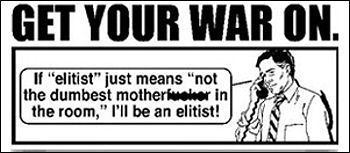In his first fall ’07 piece about awards-season Hollywood fare, N.Y. Times media columnist David Carr wonders if all the Iraq-Afghanistan war films opening over the next few months — In The Valley of Elah, Grace Is Gone, Stop Loss, Nothing Is Private, Lions for Lambs, Charlie Wilson’s War and Redacted — are going to meet with any box-office success.

Carr seems at least half persuaded that they may not. The tide of anti-war feeling across the U.S. “is bringing a wave of films about a war that most Americans wish would go away,” he writes.
“Historically, audiences enter the theater in pursuit of counter-programming as an antidote to reality,” he notes. “They’d generally prefer to see Meryl Streep inhabiting Anna Wintour in The Devil Wears Prada rather than playing a seasoned reporter who covers a country that seems to be in the midst of melting down, as she does in Lions for Lambs.”
Why? Because millions of people out there are walking expressions of doped-up lifestyles (i.e., addicted to alcohol, cell phones, general affluence, fatty foods, TV, Tivos, iPods, iPhones, SUVs, various medications, cigarettes and what-have-you …anything that will filter out reality) and states of total political denial.
“And these films have to compete not only with one another, but also with the drumbeat of the news media’s daily coverage of the Iraq war. Another I.E.D., another four Americans dead. Now, who wants popcorn with that?”
One HE dispute: Carr writes that the above films “all take as their central concern the price of America’s military and security activities since the attacks of Sept. 11.” But that’s not true as far as one of these films are concerned, and it’s a stretch with another.
Nothing is Private is a period piece (set in a Houston suburb in ’90 and early ’91, around the time of the Gulf War) that obviously reflects upon American attitudes about Middle Eastern natives now and before, but it’s flat-out wrong to say that its “central concern” is U.S. military and security activities since the World Trade Center attacks. Charlie Wilson’s War also sends out strong echoes about the 9.11disaster (particularly at the very end), but it’s an early ’80s period dramedy about the covert arming of the Afghanistan Muhjadeen in their fight against Russian invaders.









